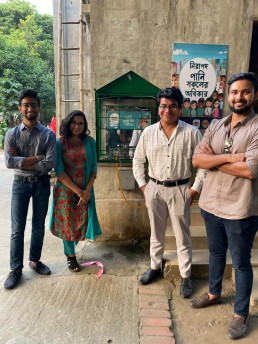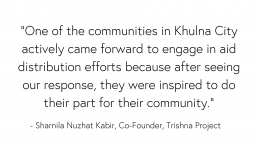Founders Resiliency Stories:
Project Trishna

Founders of Project Trishna, an initiative of the Footsteps Foundation
The spread of COVID-19 and the associated government response in Bangladesh has resulted in millions of people becoming unemployed with marginalised community groups such as poor women and other minorities being most impacted.
In response, ygap Bangladesh alumni venture, Project Trishna, initiated an emergency relief response, providing relief packages including essentials such as rice, lentils, salt, cooking oil, potatoes and antiseptic soap, specifically for the most marginalised members within society. Already 157 individuals and 571 families across 13 unions have accessed these much-needed relief packages who would not otherwise receive any other support.
“One of the communities in Khulna City reached out to us two weeks after their aid distribution to refer to nearby communities that needed help, and actively came forward to engage in aid distribution efforts because after seeing our response, they were inspired to do their part for their community” said the team of Project Trishna, an initiative of the Footsteps Foundation Bangladesh.
The ygap Bangladesh team spoke with the team of Project Trishna about the impact of the pandemic on their venture, how they are responding and their vision for a world beyond COVID-19.
How has COVID-19 affected Project Trishna?
Due to COVID-19, almost all of Project Trishna’s activities have had to be put on hold.
It has been impossible to carry out regular monitoring of our site and installations, as well as servicing visits by our logistics teams. Due to schools being declared closed until September 2020 by the government, our existing systems will remain unused till the end of that period.
The closure is hindering our scope for new implementations and has put businesses into an uncertain economic period, thereby reducing our scope of prospective CSR (Corporate Social Responsibility) partners.We have also been unable to import system components as these products are imported from Taiwan and China. Finally, our revenue sources have dried up and our runway is decreasing given our current burn rate and lack of new income.
What support is Project Trishna providing to those affected by COVID-19?
We introduced an emergency relief response at the beginning of the lockdown in Bangladesh. This was to address the number of essential workers who did not have access to work throughout the lockdown period and could not afford basic food for themselves and their families. This support was provided to communities who are under the scope of Project Trishna, as well as low-income communities outside Dhaka. We focused on the highly marginalised and stigmatised members of society who were being overlooked by mainstream aid distributions efforts. This included women in prostitution and members of the LGBTQ+ and Hijra communities. We provided food packages containing rice, lentils, salt, cooking oil, potatoes, and a bar of antiseptic soap.
This is important because most of Bangladesh’s labour force is suffering due to lack of work and cannot access essentials such as food and soap. As we are unable to carry out operations in terms of Project Trishna, we have opted for an emergency response and thus far have reached 157 individuals and 571 families across 13 unions (administrative geography) .

What have been the challenges you’ve faced?
As an entrepreneur, the uncertainty surrounding business, job and income security are some of the challenges I’ve faced. As a business, and in relation to our COVID-19 response, it has been hard to mobilise due to lockdown, insufficient donations and insufficient knowledge.
What are the key ingredients for overcoming challenges?
Our key ingredients are embracing self-awareness regarding the crisis and crisis response, using time to our advantage in thinking out of the box or remodelling approaches, implementing a discipline oriented approach towards uncertainties and unforeseen future and engaging in creativity, exploring new methods, and spending time on creative solutions.
How have you been able to adapt so fast in the face of a pandemic?
Coordination and cooperation from the team, with all hands on deck. We have been able to brainstorm and creatively adapt to the scenarios as it happened.
What does a post COVID-19 world look like for Project Trishna?
For Project Trishna, community-based mobilisation is essential in achieving project outputs and long term outcomes. While the government has ramped up hand-oral hygiene (in light of COVID-19), access to clean drinking water is still a problem. Our project stance will now look into developing new community guidelines in our post-crisis activities.
Project Trishna supports the Bangladesh government’s commitment towards SDG 6, particualry SDG 6.1, access to safe drinking water. For more information, check here: https://www.footstepsbd.org/
Project Trishna was a participant in the ygap Bangladesh 2019 Program.
